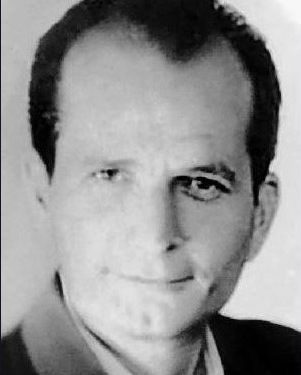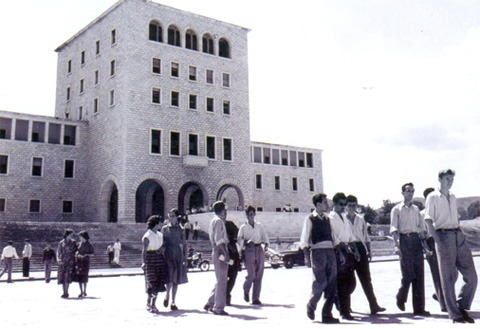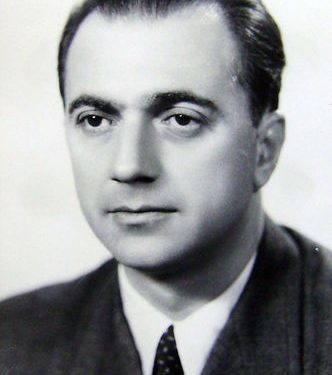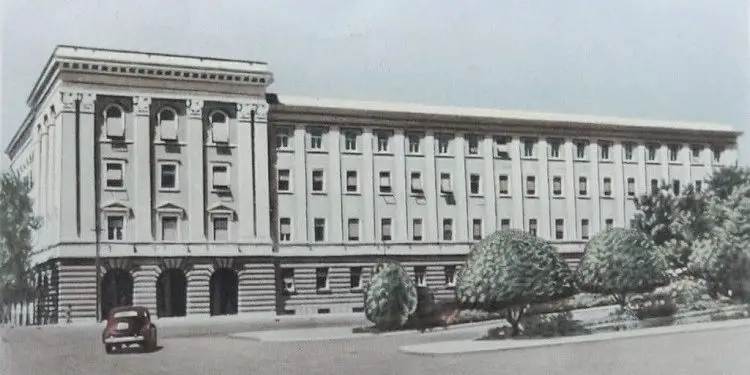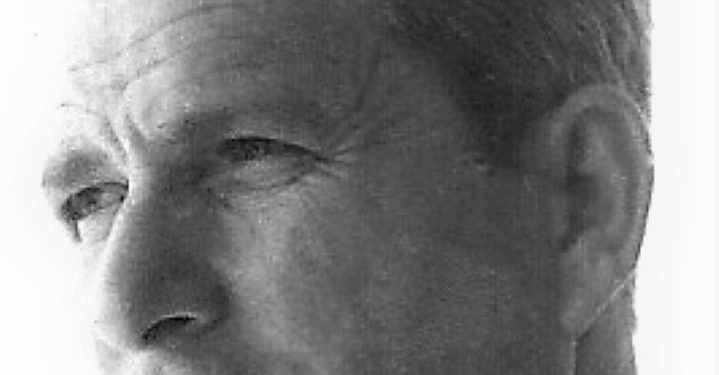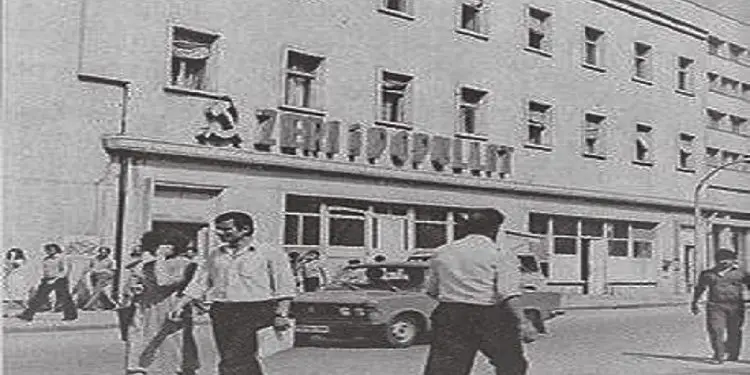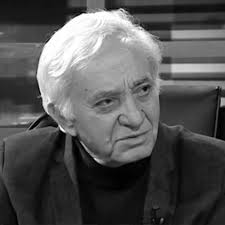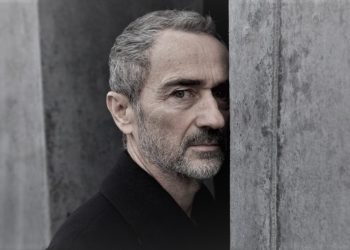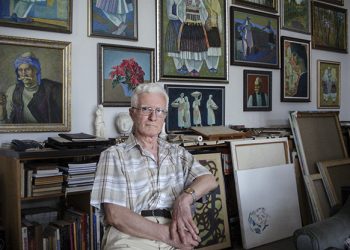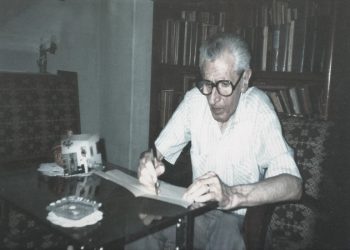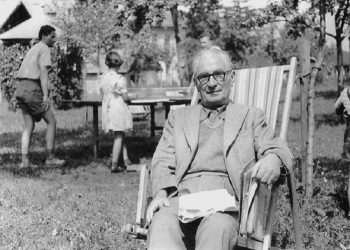Vehbi Skënderi, a prominent creative individual of Albanian poetry –
Memorie.al / Poet Vehbi Skënderi was born in Ersekë on May 18, 1927, in the family of a high cleric from Strelca, Korça. His father, Imam Demir Efendi, had completed his higher religious studies in Istanbul. He was a learned man, had one of the richest libraries of that time, in Arabic and Persian, had liberal anti-communist views, was for genuine interfaith coexistence and showed sympathy for Western democracies: he sent his eldest son, Kadri, to the Fultz American Agricultural School, in Golem, Kavaja. Imam Demir Efendi had served as a cleric in Korça, Ersekë, Pogradec, etc. His mother, Selimeja, although self-taught, in addition to religious books, also read literature in the Albanian language. She was the Chairperson of the Commission for the Fight against Illiteracy in the whole of Gora.
Vehbiu completed his primary school (five grades) in Strelce in the years 1934-1939. In 1940, he was forcibly mobilized by the Greek army to the front line, to open and maintain roads. There he experienced the horrors of war up close: hundreds of wounded and maimed fighters passed before his eyes every day. In the years 1941-1943, he continued his religious studies at the Tirana High Madrasa, where among the teachers were the well-known orientalist Vexhi Buharaja, Professor Mehdi Bushati, Hafiz Ismet, etc. In May 1943, he interrupted his studies and became a partisan in the Dibra Brigade, with commander Haxhi Lleshi, where he survived three injuries. In 1944, he was accepted into the ranks of the Albanian Communist Party.
With the end of the War in 1945, he transferred to the People’s Defense Division. At the beginning of 1947, he was admitted to the Turana Sanatorium, with an advanced tubercular process, when he received a report to be permanently separated from the army. In 1951, he began a two-year aesthetic course, where lectures were given by Jakov Xoxa, Bedri Dedja, Mark Gurakuqi, etc. In the years 1953-1956, he completed the vocational high school (Russian branch). In the years 1956-1961, he completed the Faculty of History-Philology, with very good results. Vehbi Skënderi knew Russian, Italian and French very well.
Activity as a journalist
Vehbi Skënderi began his cooperation with the press at the newspaper “Arma e Mbrojtës” of the People’s Army, which was published by the Ministry of Defense. His first writing that found a special echo was the one published in 1945, in the newspaper “Bashkimi”, with the title “Myfiti”, where he paints the portrait and story of a Cham from Filati. In the years 1949-1953, he was an editor in the magazine “Miqësia”, with Gjovalin Luka, while in the years 1955-1956, in the magazine “Hosteni”, with Spiro Çomora. In the years 1956-1959, he was a special correspondent in the daily newspaper “Bashkimi”.
From 1960 to 1966, he worked at the magazine “Ylli”, where he was a journalist and a member of the editorial board. In 1973-1974, he was the poetry editor at the “Naim Frashëri” Publishing House in Tirana. Vehbi Skënderi was able to resume his brilliant journalistic activity only after 1992, with the overthrow of the communist regime of Enver Hoxha and his successor, Ramiz Alia. In these years of the post-communist period, Vehbi Skënderi published journalism and poetry, mainly in the daily newspapers “Rilindja” of Kosovo, which was published in Tirana, and “Bota Sot”.
Activity as a poet
Vehbi Skënderi published his first poem, which was very successful, in the magazine “Letërsia jonë” in 1947. In 1950, at the proposal of the poet Lasgush Poradeci, he was accepted as a member of the Albanian Writers’ League, without being a candidate. In 1953, he published his first book of poetry, ‘Këngët e para’. Since then, he has published the poetry books ‘Poems’ (1958), ‘Leaf from my diary’ (1964), ‘Poems and poems of Drini’ (1969), ‘Continuation of a conversation’ (1971), ‘The death of Ophelia’ (1971), ‘The eagle of Vermoshi’ (1972), ‘Morning again’ (1973), ‘Poems and poems selected’ – Column of Albanian poetry (1973), ‘The years ring’ (1983), ‘Hurry up’ (1987), ‘Let’s do it as if’ (1995), ‘The stolen moon’ (2000), ‘My Switzerland’ (2004).
For “Leaf from my diary”, in 1966, Vehbi Skënderi received the Republic Prize.A year later, he won a prize in the national competition for the poem ‘Continuation of a Conversation’. He also won other prizes from publishing houses in various national competitions. His poems are included in anthologies and school textbooks of the time and in publications of Albanian poetry in foreign languages. The last volume, ‘Morning, Albania – Lyrics of an Eighty-Year-Old’, which was published posthumously, was completed by the poet Vehbi Skënderi in early 2009.
The long ordeal of persecution…!
Vehbi Skënderi’s clashes with the regime of the time came to light in 1966-’67, when he wrote the column; ‘The Club of the Calm or, The Club of the Happy’, for the Club of the League of Writers and Artists. A party secretary for ideology said at the time that; “this column contains more poison than the most anti-party novel of the time”. That same year, with a group of prominent intellectuals – Professor Selman Riza, Professor Ligor Mile, Professor Dhimitër Pilika, Colonel Dilaver Radeshi, the well-known historian Zija Shkodra, Major Bektash Bedo, etc. – he prepared a “Press Brigade” and submitted it for publication to Zërin i Popullit.
In this pamphlet, the Institute of History and the Institute of Linguistics were severely criticized: the Institute of History, instead of dealing with major figures and eras of national history, dealt only with Haxhi Qamili, not producing any monographs on Pyrrhus of Epirus, Teuta of Illyria, Skanderbeg, Ali Pasha Tepelena, Hasan Prishtina, Ismail Qemali and Fan Noli, not producing any studies on Antiquity, the Middle Ages, the National Renaissance, not producing any studies on Kosovo. The Institute of Linguistics had not yet prepared the Dictionary of the Albanian Language. The pamphlet was not published. The editor-in-chief of ‘Zërit të Popullit’, Todi Lubonja, handed over the manuscript to the first secretary of Tirana, Manush Mufti, and the Politburo dealt with it, describing it as “hostile activity, the same as the Tirana Party Conference”.
In the Central Committee, during the sessions of the political trial terror, they accused him of anti-party activity, because according to them, he attacked the institutions of the dictatorship’s superstructure and was a nationalist, since he declared that he saw Kosovo as part of Albania. The trial was so terrible that one of the members, the late Bektash Bedo, committed suicide. Of this group of intellectuals in the years of transition, only Professor Selman Riza was rightly appreciated with high honors, while for the author of this article, Vehbi Skënder, silence has continued during these twenty years. The late Professor Zija Shkodra, after the fall of the monist dictatorship, in a long article, shed full light on the key role of Vehbi Skënder.
In 1967, for five consecutive years, Vehbi Skënder, now a banned author, was sent to the Vaun i Dejës Hydropower Plant, sentenced to corrective labor. A year later, the deputy director of the Internal Affairs Branch of Shkodra is sent to the Zadeja Shipyard to do physical labor. He asks Vehbi Skënder to become a Sigurimi agent, which the writer categorically refuses. The senior Sigurimi official swears to the writer that he will regret this refusal. Transferred as deputy director of the Internal Affairs Branch in Tirana, he repeats the threat to the writer several years later. In 1974, under the instructions of the First Secretary of Tirana, the State Sigurimi devises other reprisals against Vehbi Skënder, who is expelled from the party, from the Writers’ League, from work, his books are burned and his publication is prohibited.
In 1975, he is exiled to Shkodra, but the Shkodra district authorities do not accept him, because there is no written decision. In 1976, he was interned with his family in the remote village of Zall-Mner in Tirana. After four years of unemployment, he was assigned as a transport worker at the Printing Plant, in the printing department and in the waste disposal warehouse. After about ten years of that hard work, his publishing rights were restored. But the Writers’ League declared that his full rehabilitation as an author would only take place sometime between 2030-2040…!
He retired in 1987, having been a proofreader in the dispensary department at the Printing Plant. From June 15, 1996, Vehbi Skënderi lived and created in Switzerland, with his beloved family, with his wife, his two nephews, his son-in-law Skënder Buçpapaj and his only daughter, Elida Buçpapaj, who surrounded him with exemplary love and care, until the end of his life. On June 13, 2011, at 4:30 AM, in the cantonal hospital of Basel Land, Bruderholzspital, where he was admitted on the morning of September 11, 2011, the heart of Vehbi Skënderi, the indomitable poet, stopped beating in the face of the persecutions and bans he experienced from the brutal communist dictatorship and directly from the State Security.
They have said about Vehbi Skënder:
WRITER NAUM PRIFTI:
“With Vehbi I had the good fortune to work on the illustrated magazine ‘YLLI’ for six years, from 1960 until 1967, when I was sent for re-education in Divjaka, in March 1967. ‘Ylli’ was the first illustrated magazine, with three skilled and experienced editors, Vehbiu, me and Pipi Naçe. Our editor-in-chief was Qamil Buxhel. We editors got along very well with each other, we collaborated, consulted and always understood each other for our own good and the good of the magazine. Vehbiu was the example of spiritual purity, of a man with an open and sincere heart.
Later I learned of his great suffering, dismissal from his job as a journalist, loading and unloading worker in Vau i Dejës, but the poet turned porter, remained strong, he did not give up, he did not surrender and he won over the vileness and constant intrigues of the short-sighted party members. I am sure that his poetic creativity will be appreciated more and more, because he has left behind artistic creations, beautiful, sincere and full of inspiring feelings. His name will be remembered with respect by future generations. They did not appreciate him while he was alive, but that is how life is”.
WRITER AND CRITIC AGIM VINCA:
“The patriotic poet had a great wish fulfilled: he managed to see Kosovo free, which he loved so much and for which he sang with such inspiration, as well as for Albania, and even from Switzerland, where he spent the last years of his life. Poets who have sung so beautifully and with such passion about life, freedom, homeland, nature, love and everything else beautiful in this world are rare. The poet Skënder is an author who does not accept death, ‘but throws it away’, until he sees a free Kosovo alive. His will and dedication to the Homeland, to the Albanian space in general, and to the desire for the freedom of Kosovo in particular, to see it free and independent”.
This dedicated desire of Vehbi Skënder, the critic Vinca has called as; “contract” with death, which the poet did not want in any way, without enjoying the change in the status of Kosovo. This opinion is not accidental, but comes thanks to the assessment of the artistic and lyrical verse of the poet Skënder, which is made by the literary critic Agim Vinca, who is known for the creative research of all Albanian creators, especially poets in all Albanian spaces. Then, for the poet Skënder, the Albanian space is not limited. Struga, Dibra, Presheva, Ulcinj, are a common ground, where one language is spoken, and where one people lives. This phenomenon of not limiting the Albanian space, we notice in previous publications with the poems: “Kosovo”, “In this place…”, “The Murder of Shotë Galicë”, “The Sacrifice”, (dedicated to the Gërvalla brothers and Kadri Zeka) and many other poems”.
“The author, in all these poems, touches not only the element of the bitter history of the Albanians, which they were experiencing for years, but also the element of national maturity, which maturity was starting from the individual and slowly continuing in the entire society. Therefore, he treats the element of sacrifice for the freedom of the country very clearly, with genuine human morality, in the verses dedicated to the brothers Gërvalla and Kadri Zeka, who had set out on the most sublime path, which led to the freedom of Kosovo and all Albanians. A poet who has a verse dedicated to the freedom of humanity, regardless of the geographical spaces of the globe, who does not see race or religion, but prioritizes the freedom of people around the world. This element is very present with examples from the most diverse artistic creations in his latest volume: “My Albania, Switzerland”!
“A poet who respects love for women with devotion, and puts the term “Woman” in the pillar of the house, which he closely connects with the features of the Homeland. Although the motif of love for the poet remains a continuation of previous publications, for love the character of the beautiful woman, we are also presented with a foreign (non-Albanian) woman, distant from our Albanian cultural environment. The black woman, in the poet’s verse, represents the features of beauty, elegance, and attraction. In this case, we have an advancement of the poet, because in previous publications the woman, or the beauty of the woman, was personified more with the element of Albanian social life, while, creating in Switzerland, he does not limit this element, or does not adhere fanatically to this line, but supports in the background all beautiful women, even when they are; “black as roasted coffee”.
“Vehbi Skënderi sings in poetry and his lyrical verse has a lot of musicality and rhythm, but he also writes, and his thoughts always remain fresh. The uniqueness of this artistic inspiration lies in the value of the element of communication. From artistic expressions we learn that the author is easy to communicate, accepts anyone in conversation, and when he starts speaking, he shows the things he knows, with very clear language, and thus this communication in Skënderi’s verse takes on the artistic melody alongside the communicative element in everyday life”.
PRIME MINISTER SALI BERISHA:
“Vehbi remains in the field of Albanian letters and poetry, one of their most prominent names, great creators, but Vehbi Skënderi belongs to those Albanian intellectuals who, for the protection of the values, ideas and views that he believed in, stood with great manliness and courage, sacrificed, but was not defeated”.
PRESIDENT BAMIR TOPI:
“Vehbi Skënderi was a worthy representative of that constellation of literary figures and personalities, who never betrayed their ideals, never lost the free spirit of a poet, their pure thoughts, their passion and desire for life, but above all their love for their homeland. Time was harsh on them, but in the memory of the nation, they will always remain on the pedestal of human and national values thanks to the invaluable heritage they have left to future generations”.
WRITER MOIKOM ZEQO:
“The name of the genuine, strange lyricist Vehbi Skënderi will never be forgotten. I am convinced of this”.
WRITER VISAR ZHITI:
“I knew him, he loved us when we were not loved, we loved him even when he was banned by the dictatorship, along with the other unyielding ones. His beloved voice, now antalogical, returns, bringing His life, the poet’s life and as such it is endless”.
CRITIC KLARA KODRA:
“In the first phase of Vehbi Skënder’s creativity, the preferred theme of his poetry was the life and psychology of working people, treated with a lyricism that merges into a concreteness of details. After 1990, Vehbi Skënder began to treat existential themes, renewing his creativity with a universal philosophical dimension and psychological depth. Vehbi Skënder is a poet with spontaneous inspiration and with an expressive and unique poetic language”.
WRITER AND CRITIC XHAHID BUSHATI:
“I have read those books carefully. I read them again…! I am filled with spiritual longing and reverence for my friend, the distinguished poet, Vehbi Skënderi, one of the elites of Albanian poetry. I read those magical poems because I want to respect those values as legacies that the poet left, with whom, even in Bahriu’s presence, in the different environments of the Zadeja shipyard, I had the opportunity to drink coffee several times. Every conversation with him was a lesson in knowledge for me. He expressed his thoughts beautifully; he spoke beautifully and colorfully.
A word and expression full of dreams and love of life. And every time I left that conversation, because the meeting I didn’t want was ending, I wanted to return again…! I am returning to poetic books. I had the opportunity to get to know those labor landscapes. I had the opportunity to get to know them even from the third shift. Every line of his poetry the poet, became dear to me. He became real. Even in that environment, often gray and wild, he skillfully found the beautiful, the amazing, the miraculous. He found the spiritual beauty of man, his beautiful soul. He found the desire to live…! Therefore, those books became dear to me and have a place of honor in my library.
For myself, and I say this with conviction, I have not seen any poet have sung so beautifully, full of pathos, the old Drin, or as Vehbiu said in one of his brilliant verses: “… here are the springs of eternal youth”. Therefore, in every wave crest, steep cliffs, in the twinkling of lights that resembled stars, in the muddy roads of the construction site, in the laughter, the laughter… there is also the poetic and unstoppable song of the distinguished poet, Vehbi Skënderi, which resembles the journey of the old Drin, which has no end. Honor”!
THE LEADING WRITER OF DIBRANI:
“Vehbi Skënder’s poetic book ‘Bëjme sikur’ (Let’s Act as If) captures more disturbing issues that may pertain to the creative and artistic individuality of a poet. Although the content of this book is mainly composed of lyrics, it successfully manages to offer a whole world of feelings and concerns, but without hurting anyone’s soul. In fact, it manages to absorb the reader, introducing him or her into the delightful world of lyrical meditation.
Lyric poetry is a specific genre of literary creativity, therefore, Vehbi Skënder’s poetry, which is included in this book, can be treated as poetry of lyrical existentialism, as genuine and committed poetry. The forms of this poetry are intertwined within this book, interconnected with a configuration of ideas and thoughts of the most beautiful and with clear messages, where it highlights the fate of the individual as part of the collectivity in our daily lives, or in other words, describes with emotions, the changes of major events that occurred in Albanian society during the nineties”. Memorie.al




